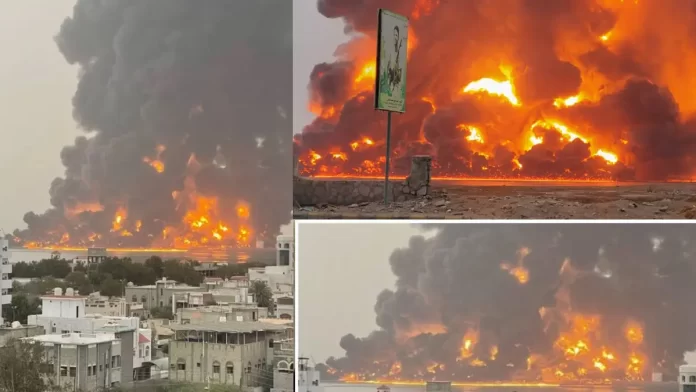In a dramatic escalation of tensions, Israel has carried out airstrikes on the port city of Hodeidah in Yemen, just a day after a drone attack targeted Tel Aviv. The airstrikes, which struck a refinery and electricity infrastructure, ignited massive fires visible across the city. This marks the first direct military engagement between Israel and Yemen since Houthi rebels initiated missile and drone attacks against Israel last year. The strikes reportedly killed 3 and injured 87, mostly with severe burns. While Fatal Houthi Drone Strike on Tel Aviv Leaves 1 Dead, 87 Injured.
The conflict intensified when a drone launched by the Houthis hit central Tel Aviv, claiming the life of one person and injuring at least ten others. In response, Israel’s Defense Forces (IDF) deployed fighter jets to target military installations at Hodeidah Port, citing numerous attacks against Israel in recent months as justification.
Prime Minister Benjamin Netanyahu underscored that the port was targeted due to its military use, affirming Israel’s resolve to reach any location to defend itself against threats. Defense Minister Yoav Gallant echoed this sentiment, emphasizing that the strike sends a clear message to adversaries.
Initially, confusion surrounded the source of the airstrikes, with Yemen’s Houthi-run Almasirah TV attributing them to US and British forces before retracting the statement. Reports later indicated that Israel, supported by the US and UK, executed the operation, involving advanced fighter jets.
The strikes in Hodeidah follow a vow by Israeli officials to retaliate after the drone attack in Tel Aviv, which the Houthis claimed involved a new type of radar-evading drone. Despite initial claims of interception failure due to “human error,” Israeli authorities vowed to enhance air defense capabilities in response to escalating threats from groups like Hezbollah.
The ongoing conflict has also drawn international attention, with implications for broader Middle Eastern stability and diplomatic maneuvers at the UN, where Israel faces scrutiny over its occupation policies in Palestinian territories.
As tensions persist, Israel’s military strategy continues to evolve amidst growing regional challenges, with implications reaching beyond immediate military engagements.
Key Points
Inciting Incident: Houthi rebels targeted Tel Aviv with a drone attack, resulting in casualties and injuries.
Israeli Response: Israel retaliated with airstrikes on Hodeidah Port in Yemen, targeting military installations.
Casualties and Damage: Airstrikes caused significant damage to refinery and electricity infrastructure in Hodeidah, resulting in casualties and widespread fires.
Military and Political Statements: Israeli officials, including Prime Minister Benjamin Netanyahu and Defense Minister Yoav Gallant, emphasized the necessity and extent of their response to defend against threats.
International Involvement: Initial confusion over airstrike attribution, clarified to involve Israel with support from the US and UK, highlighting regional alliances and tensions.
Broader Context: The conflict underscores broader regional instability, impacting diplomatic relations and international policy, particularly concerning Israeli occupation policies in Palestinian territories.
Ongoing Developments: The situation continues to evolve with implications for regional security and international diplomacy efforts.



